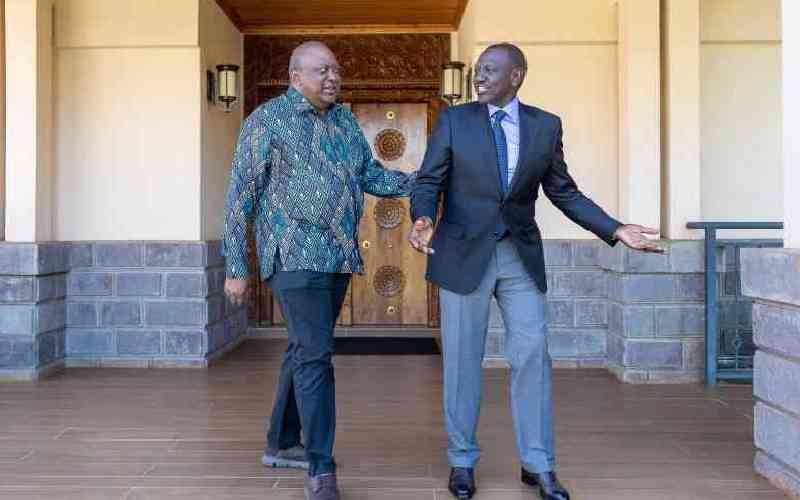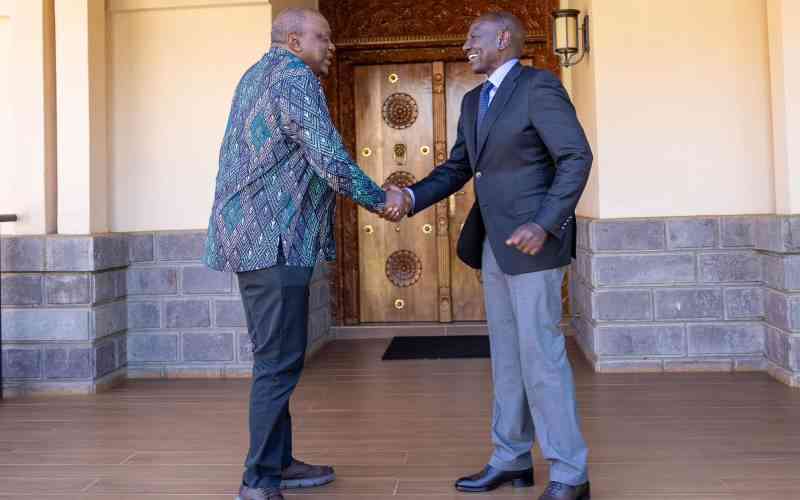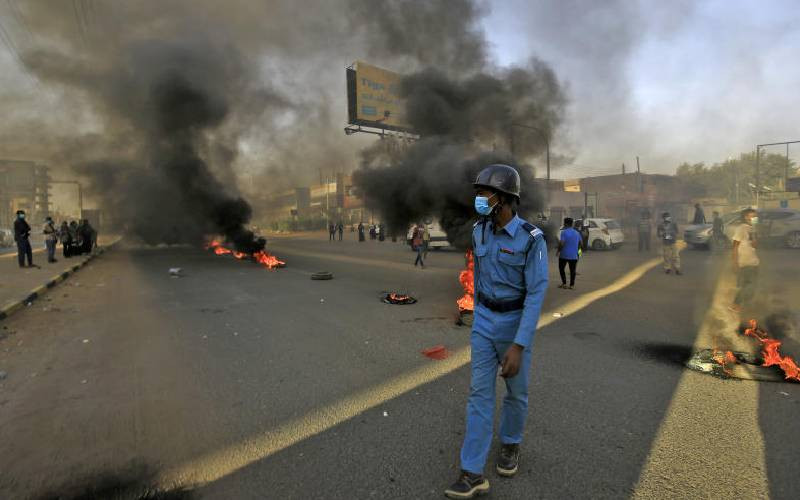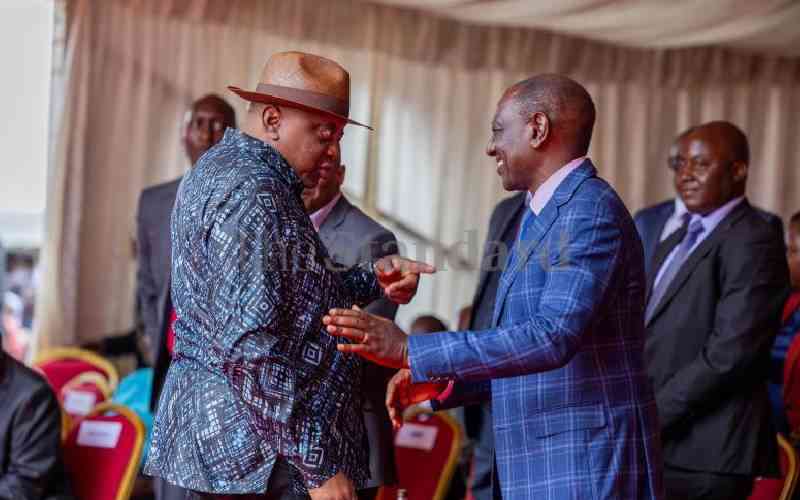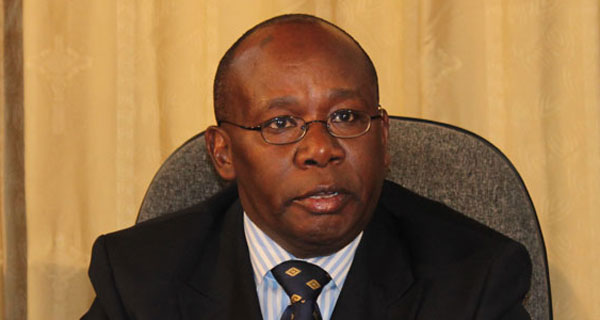 |
|
Attorney General Prof Githu Muigai. |
By ALLY JAMAH
Kenya: Besides battling The Hague court demand for records of President Uhuru Kenyatta’s financial transactions, the Attorney General has another assignment at the International Criminal Court (ICC).
Prof Githu Muigai has the extra burden of explaining why the Kenya Government cannot execute a request to produce seven ‘insider witnesses’ who curiously did not take the witness box despite having recorded statements.
Githu, who is the President’s chief legal adviser and is already in The Hague, will today be arguing that the Kenya Government cannot compel seven key witnesses who have cut ties with the prosecution to testify against Deputy President William Ruto.
Though the witnesses were lined up against Ruto and in the prosecution’s view they gave compelling evidence, Uhuru is drawn into the picture because it is his Government that is being asked to deliver them to the court.
Githu has already told the court that the application by Prosecutor Fatou Bensouda to force their attendance was unconstitutional.
On Wednesday, the ICC posted Githu’s written submissions in accordance with court regulations.
Githu will be addressing the Uhuru issue today and the Ruto-Sang case witnesses question tomorrow.
Bensouda wants the ICC judges to compel the Kenya Government to surrender the seven witnesses to her. The witnesses are identified as P-0015, P-0016, P-0336, P-0397, P-0516, P-0524 and P-0495.
One of the witnesses, P-0495, checked out of his hotel room and left “no forwarding information”, as the prosecution was processing his Dutch visa so he could testify in The Hague last September.
The witnesses had Kenyan lawyers draw up affidavits that notified the ICC of their withdrawal.
Bensouda claims they were bribed and intimidated to pull out, but some of the witnesses said the case had become politicised.
The Prosecutor wants the seven witnesses arrested and detained in The Hague, saying they will interfere with cases if they are allowed to stay in Kenya.
But Githu insisted that Kenya’s obligation as a state party to the ICC was to facilitate the voluntary appearance of witnesses to testify before the court.
He termed the prosecution’s move as disrespect to Kenya’s sovereignty and independence of the Judiciary.
Stay informed. Subscribe to our newsletter
“The prosecution can only offer its understanding of the Kenyan national law on summoning witnesses and cannot assert what the interpretation and application of Kenyan legislation actually is,” he said.
He insisted that the prosecution had not demonstrated that Kenyan courts were incapable of doing their job of interpreting the country’s laws Githu accused the prosecution of attempting to expand the power of the ICC through the back door, by assigning to it the power to compel witnesses to testify before it, saying such power is not contained in the laws that established the court.
Today, the AG will also tell judges why the Government cannot turn over Uhuru’s financial records in yet another battle with a prosecution that is banking on the information to keep the cases against the Head of State alive.
In an application made public yesterday, which points to the AG’s line of argument during Friday’s crucial hearings in the Netherlands in the Ruto case, Githu contends that giving oral testimony before court should be voluntary.
Bensouda had told judges in November that the seven witnesses currently live in Kenya, but the prosecution has “experienced difficulties securing their attendance”.
She claims that their statements address the “core planning events and allegations of personal involvement” by Ruto and his co-accused, radio journalist Joshua Sang.
Bensouda has asked the judges to order Kenyan authorities to issue summonses to them to either appear in The Hague or give evidence via video link from Kenya. She contends that the Kenyan law permits that.
But the AG said: “The Government of Kenya submits that the prosecution improperly arrogated to itself the power to interpret Kenya’s national laws, which according to Kenya’s Constitution is a preserve of Kenya’s courts, as it related to the appearance of witnesses to testify before the court and powers of the Kenyan courts in that regard.”
Githu argued that under the ICC Act, passed by Parliament in 2008, a witness cannot be compelled to appear and testify before the court.
He added that the laws that established ICC provide that witnesses can only appear in court to testify voluntarily. “The court has no power to request the Government of Kenya to compel unwilling witnesses to appear and testify before the court,” the AG argued.
Breach of treaty
Githu will further be arguing that such a move would be a breach of the treaty that formed the court.
“The Prosecutor cannot legally and legitimately impose obligations on Kenya as a state party to the Rome Statute, beyond those obligations that the statute itself imposes on states parties,” said Githu.
He added: “Requiring the Government…to exercise judicial authority in compelling witnesses would be an attempt at imposing obligations on a state party that exceed the treaty obligations.”
The AG also dismissed the assertion by Bensouda and her prosecution that the ICC has judicial powers to compel witnesses to appear before it against their will.
Bensouda had argued: “If the court’s ability to hear oral evidence were to depend entirely on the inclination of witnesses to appear voluntarily, it would be hostage to the continuing goodwill of its witnesses and at the mercy of external forces.”
Githu also clashed with the prosecution on the interpretation of Article 64 of the Rome Statute.
He said that “requiring the attendance” is not identical to “ordering”.
He added that the same section does not provide for any punishment or sanction to witnesses for non-attendance.
He argued that if the court had power to compel witnesses to testify before it, there would have been punishment or sanction set out in the law that formed the court.
Githu claimed that the legislative history of the drafting of the Rome Statute that formed the ICC does not give an indication that it was the intention of the founders of the treaty to give the court powers to compel witnesses to appear before it.
“The founders of the Rome Statute intended that the court be complementary to national criminal jurisdictions, and thus at the same level with national courts of states parties,” he argued.
“This is unlike the case of ad hoc judicial tribunals like that of Rwanda and the former Yugoslavia, which have powers to compel or order the attendance and testimony of witnesses from states parties and request the states parties’ assistance in this regard.”
 The Standard Group Plc is a
multi-media organization with investments in media platforms spanning newspaper
print operations, television, radio broadcasting, digital and online services. The
Standard Group is recognized as a leading multi-media house in Kenya with a key
influence in matters of national and international interest.
The Standard Group Plc is a
multi-media organization with investments in media platforms spanning newspaper
print operations, television, radio broadcasting, digital and online services. The
Standard Group is recognized as a leading multi-media house in Kenya with a key
influence in matters of national and international interest.
 The Standard Group Plc is a
multi-media organization with investments in media platforms spanning newspaper
print operations, television, radio broadcasting, digital and online services. The
Standard Group is recognized as a leading multi-media house in Kenya with a key
influence in matters of national and international interest.
The Standard Group Plc is a
multi-media organization with investments in media platforms spanning newspaper
print operations, television, radio broadcasting, digital and online services. The
Standard Group is recognized as a leading multi-media house in Kenya with a key
influence in matters of national and international interest.


